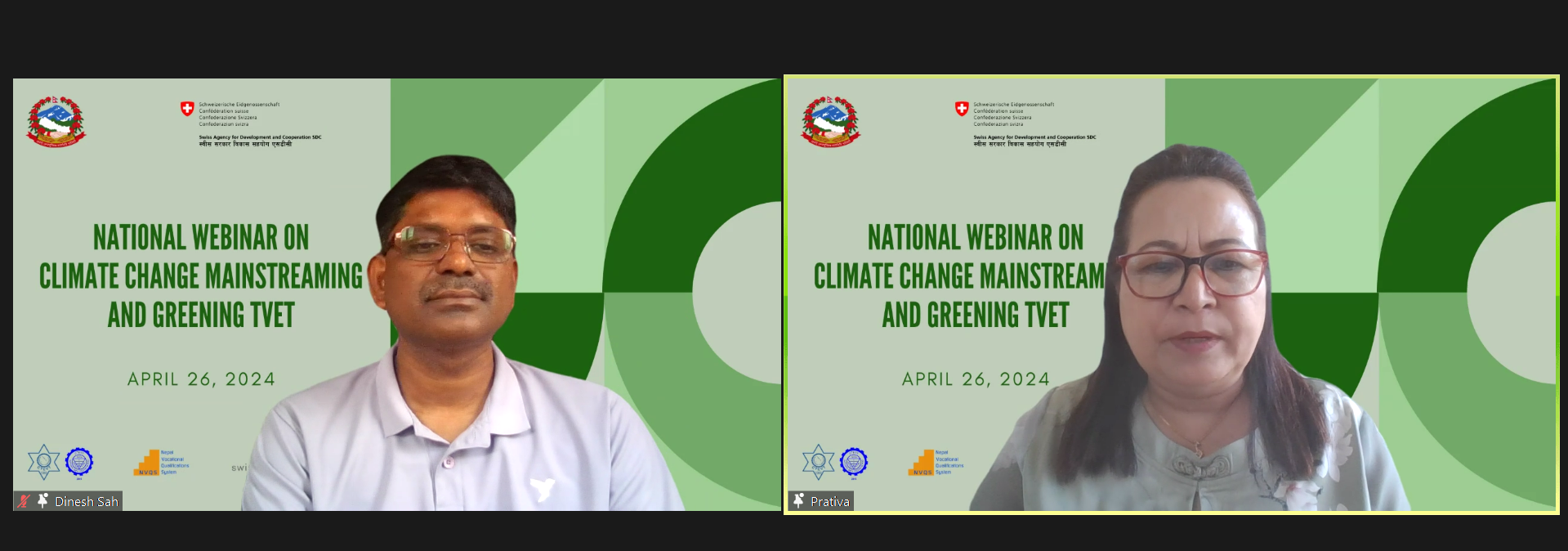National Webinar highlights strategies for Climate Change Mainstreaming and Greening TVET

In a concerted effort to address the pressing issue of climate change and its integration into Technical and Vocational Education and Training (TVET), a National Webinar on Climate Change Mainstreaming and Greening TVET was convened on April 26, 2024. The virtual event, organized from 11:00am to 1:00 pm, aimed to equip training institutions and government organizations involved in TVET with the necessary knowledge and strategies to effectively incorporate climate change considerations into their curricula and operations.
The webinar commenced with Mr. Pankaj Parajuli, National Program Officer at Swiss Agency for Development and Cooperation SDC, setting the stage by articulating the objectives and significance of fostering discussions on climate change adaptation within the context of TVET. This was followed by the inauguration remarks delivered by the Member Secretary for the Council for Technical Education and Vocational Training (CTEVT) Er. Mahesh Bhattrai. Emphasizing the significance of the initiative, Er. Bhattarai highlighted the urgent need for proactive measures to mitigate the adverse impacts of climate change, particularly through education and skill development.
The keynote session, presented by Climate Change Expert Mr. Dinesh Prasad Sah, delved into the critical aspects of climate change mainstreaming within the TVET sector. From understanding the evolving climate dynamics to identifying opportunities for sustainable development, Sah's comprehensive presentation provided valuable insights into the intersection of environmental challenges and vocational training.
Following Sah's presentation, the focus shifted to the imperative of 'Greening TVET' with an engaging session led by Ms. Prativa Joshi, Deputy Team Leader for the Nepal Vocational Qualifications System Project-Phase II (NVQS P-II). Joshi elucidated practical strategies for incorporating eco-friendly practices into TVET institutions, ranging from energy-efficient infrastructure to curriculum enhancements that promote environmental stewardship among students.
The interactive nature of the webinar was further amplified during the Question-and-Answer sessions, where participants actively engaged with the speakers, seeking clarification and sharing their experiences and perspectives on climate change adaptation in TVET.
The webinar conducted through Zoom was also streamed live through National Skill Testing Board (NSTB) and Swisscontact Nepal (SCN) Facebook pages simultaneously. Participants from all three platforms were encouraged to put their questions to the experts. Ms. Joshi facilitated the questions raised by the participants, which were in turn responded by both Mr. Sah and Ms. Joshi.
As the webinar drew to a close, the Director of the National Skill Testing Board (NSTB) Mr. Tek Bahadur Malla delivered closing remarks, reiterating the commitment of the government to support initiatives aimed at fostering sustainability and resilience within the TVET sector.
In a final gesture of appreciation, the moderator extended gratitude to all participants for their active participation and contributions towards making the webinar a success.
The National Webinar on Climate Change Mainstreaming and Greening TVET was organized by the Council for Technical Education and Vocational Training (CTEVT) with the support from NVQS P-II. The NVQS P-II is a bilateral initiative between Government of Nepal and Swiss Agency for Development and Cooperation SDC. Swisscontact provides technical assistance on behalf od SDC.
The webinar served as a pivotal platform for fostering dialogue, sharing best practices, and catalyzing action towards building a more environmentally conscious and resilient TVET ecosystem. With the insights gained from this collaborative endeavor, stakeholders are better equipped to navigate the challenges posed by climate change while harnessing the transformative potential of vocational education and training for a sustainable future.